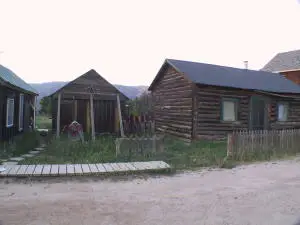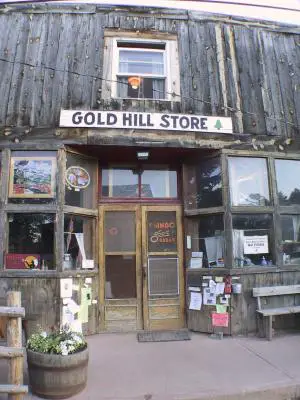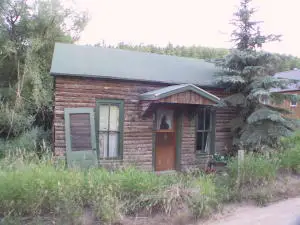| Gold Hill was thought to be the first permanent mining camp
in Colorado. Rich ores were found here in 1859 and before a year had past
1,500 miners populated the area. The first gold was of the surface variety.
When that was depleted, most of the residents moved on to other camps. Gold
Hill's second boom reached its peak around 1872 when tellurium was found.
From that time forward, Gold Hill was for real and it never died. The town
had many hotels and newspapers in its day. The Miner's Hotel, built in 1872,
is still standing and many of the original furnishings remain intact. Gold
Hill suffered its worst fire in 1894. Within hours all of Gold Hill was
deserted. The residents took refuge on the top of barren Horsfal Mountain
and watched much of their town reduced to ashes. Much of the city was rebuilt
but things were never quite the same. Submitted by Henry Chenoweth.
Submitted by Leah McKin
Perry Eberhart's book, Guide to the Colorado Ghost Towns and Mining Camps[Chicago: The Swallow Press Incorporated, 1959] relates that Gold Hill was probably the "first permanent mining camp in Colorado." He goes on to say that about 1500 miners were in the immediate area after initial ore discoveries were made in 1859. In describing the 1894 fire he records that "much of the city was rebuilt, but Gold Hill was never the same," which is not accurate. It may not have been the same in some respects because of the timber burn, the loss of homes outside town, and the fear that was probably instilled in the residents, but not because the town was burned. In fact Gold Hill was a successful mining town for some years after the fire but gradually declined as the mines played out. He also says that "The Hill" has many cabins, but that most of them are newer tourist cabins, which is also not accurate. Quite a number of the homes remaining in Gold Hill to this day (2007) were built in the last quarter of the 19th century, including that of my great-grandfather William M.Swallow(a blacksmith in the mines around Gold Hill), which is still standing, still retains its original outside form, and is presently occupied by people who have preserved much of the original interior.
NOTE: The following accounts of the 1894 fire near the town of Gold Hill, Boulder Co., Colorado, were transcribed by Leah McKin from newspaper images available at “Colorado”™s Historic Newspaper Collection” <http://www.coloradohistoricnewspapers.org/.From "The Daily Camera" (Boulder, Colorado), Thursday, 15 November 1894, p. 1
Fire In The Mountains
In a Whirlwind, Live Stock, Ranches and Forests are Wiped Away. Gold Hill Threatened. And a Conflict of Reports That Suggests Untold Misery and Devastation--Many Horses and Cattle Perish and Destruction Hovers Over the Homes of Hundreds of Families in Boulder County--Ward Preserved by a westerly Wind, But Copper Rock, Gold Hill and Sunshine in the Path of Danger. Fire's Fearful Work. Great Forest Fires Sweep Over Our Mountain Camps. Reports were current upon the streets of Boulder this morning that Ward and Gold Hill had been entirely destroyed by forest fires, and a cloud of smoke which hung over the city gave constant evidence that the report was not entirely an idle rumor. The woods were surely on fire, but whether the hamlets, whose busy industry contributes so largely to the welfare of this city, were involved admitted of question. It was soon ascertained that while the mountains surrounding them were ablaze, the camps had not been swept away. Lew Jain, of Jain Brothers' stage line, arrived from Ward at the noon hour on horseback, instead of with his daily six horse stage outfit. The reason he assigned was that the bridge at the foot of Saw Mill hill had been destroyed by fire. He said Ward was safe and the wind was blowing the flames toward Gold Hill, which he feared would suffer terribly. According to Jain, the fire had played terrible havoc with Colorado. Wesley Brainerd's great timber reserves, which he has protected for years with reference to future needs in his great mining developments. The mill, house and office were saved, though a bridge at the place was burned away. The ranches lying between Ward, Sunset and Gold Hill have all been fire swept. Zieman's barn was destroyed, though his house was saved. Crimmons, Hickock and John Wildauer's houses and barns were wiped out. Fred Ehlerlost his house and barn, all his live stock including his horses, cows and chickens, and his wagons and machinery. It is said that, in an attempt to save his property, Mr. Ehler was caught by the flames and his hands, feet and face were badly burned. One report was that when taken to Hugh Hasting's [sic; this should read ”œHenry Hastings”] place, the flesh fell from burned parts of Mr.Ehler's person. At Sunset Harry Holt's house, north of the camp and near the Bald Mountain mine, was burned, together with all the furniture. Mr. Holt was formerly a conductor running between Boulder and Denver and built a mill at Sunset and engaged in mining there. Near his place was that of John Wildauer, whose house, shaft-house and barn disappeared in the twinkling of an eye, according to the story of the driver of the Sunset-Boulder stage. The wind, which steadily kept a westward course, saved Ward, though it rendered the condition of Gold Hill very precarious up till noon.W. M. Bloomer arrived after noon from Ward by way of Left Hand. He said several cabins belonging to Colonel Brainerd had been burned and that Wheeler's ranch and considerable stock had been destroyed. A man named Carter left Sunshine at noon and said the citizens of that camp were terror-stricken. Men from other camps came in with alarming reports of the spread of the flames. Cattle and horses were caught like mice in a trap while fleeing from the flames. Burning sticks and limbs of trees would fly over their heads and ignite the tinder and leaves of the dry forest ahead of the. Hemmed in they would roast in their tracks, and this must have been the case with hundreds of heads of cattle and horses, as none were seen upon the highways. Mr. Carter said smoke in huge volumes could be seen from Sunshine over toward Copper Rock and there was no hope for the dozens of ranches lying between Sugar Loaf and Gold Hill. He looked upon the fate of the latter camp as sealed, from all he could gather, and from the fact that, while the wind in Boulder has been variable, it has kept a westerly direction all day and all night in the mountains. He says it blew a fearful gale all Wednesday night.At 2:30 Mr. Short and his son-in-law, Mr. McMaster and wife, arrived in Boulder with a wagon loaded with household goods, sewing machine and other effects. They said that at 12:20, when they left, the flames were half a mile from Gold Hill and the camp would surely go. Mr. Short lives at Denver, whither his daughter went by the afternoon train. Mr. Short said all the citizens of Gold Hill had moved their household goods to Horsfal hill, which has long been denuded of its forest. Everyone has been working like Trojans, and Francis Johnson and Frank Boyd, the store keepers, have moved their stock to this comparatively safe resort. Fred Ehler was brought to a friend's house over in Mapleton and Dr. Coman found him with both hands and feet badly burned and the hair of his face burned off. The falling flesh story was false and Ehler will come out all right although all his property was gone. It is said he was attempting to save his horses, but they perished before his eyes. Ben Jain, who started with his six-horse stage for Ward this morning, stopped at Gold Hill and returned to Boulder on account of the smoke and the assurance he had that Gold Hill was sure to go. He passed teams and saw many behind him hauling household goods. Gold Hill has about one hundred and fifty houses and the loss of the town would amount to a great deal of money. Send For Help. Henry Lippoldt during the afternoon received an order from W. H. Edwards, at Gold Hill, for two carriages with drivers. The letter stated that the town was close pressed by forest fires. It was brought down by a boy on horse back. The ranch of John Hartley on Left Hand was fire swept. Gold Hill May Be Saved. Colorado. J. L. Sanderson, who returned from Sunshine at 4 p.m., learned that the fire was one mile west of Gold Hill at 3 o'clock, near Walsted's ranch and the wind had veered to the south, which would preserve the camp. The smoke over the city is something dusky as the Camera goes to press. From "The Daily Camera" (Boulder, Colorado), Friday, 16 November 1894, p. 1 Gold Hill Was Saved. Yesterday afternoon the wind veered to the south after the fire had licked up every thing within a few hundred yards of Gold Hill. Later it began to snow, it snowed all night, and when the early morning light of a happier day broke over the hills, a mantle of snow several inches deep was upon the ground, the fire had been extinguished and all present danger had passed. From "The Daily Camera" (Boulder, Colorado), Friday, 16 November 1894, p. 4 George Streich came down from Gold Hill last night, after a hard day's work conveying property to Horsfal hill. He was able to say, however, that the camp had been saved by a merciful change of the wind. Local Republicans attribute the change of the wind and the snow, which put out the fire, to McIntire .Initems like this all can behold the fulfillment of the boast that confidence would be restored. Fred P. Johnson of the Rocky Mountain News reportorial force, arrived this morning, accompanied by his wife, and left for the mountains to make an investigation for his paper of the loss inflicted by the great forest fires. From "The Daily Camera" (Boulder, Colorado), Saturday, 17 November 1894, p. 2
Story Of The Fire.
Careless Campers Responsible for the Great Forest Conflagrations. Fred P. Johnson, after a trip to Gold Hill and the burnt district, writes as follows to the Rocky Mountain News. Mr. Johnson spent all of Friday looking into the causes and damage resulting from the forest fire and telegraphed his report in after his late return from the mountains last night: About ten days ago a party of freighters headed toward Ward camped at a point about a quarter of a mile below the Boston mill in Left Hand canon. They build a fire upon a boggy place near the creek, cooked their supper and remained there until noon of the next day. Charley Coleman, a man employed at Camp Talcott, half a mile below, called upon the campers and remonstrated with them for building a fire in such a place. They laughed at his fears and promised that they would put out their fire before proceeding on their journey. The fire had taken hold upon the roots of the trees in the neighborhood, however, and on Wednesday night the wind rose and about midnight the flames sprang to the surface and before they were observed the whole neighborhood was ablaze. Fanned by a wind that was almost, if not quite, a hurricane, the fire spread rapidly down Left Hand canon toward Camp Talcott and south over the hill toward Gold Hill, Sunset and Copper Rock, carrying with it destruction to everything in its path. Saved Only A Few Clothes On the top of the hill above Left Hand, where the wagon road leading east to Gold Hill and Boulder climbs over the summit, lived John Anderson, a miner, in his little cabin nearby his mine and shaft house. He was awakened at 1 o'clock by a suffocating smell of smoke and found his home in flames. Barefooted ashe was when he sprang from his bed and pausing only to grab a handful of clothes, he ran for his life, pursued by the flames and smoke. He ran half a mile before he found time to put on his clothes and then raced on the warn his neighbors. Two miles east of Anderson's along the range, lived Fred Ehler. He was awakened about 1:30 and found his house full of smoke. Looking out of the window he saw his barn in flames. Pausing only to awaken his family, he rushed out to save his stock, but it was too late. Two horses, two cows and three calves were in the barn, but their doom was sealed. Mr. Ehler made an attempt to save his new wagon, but nearly lost his life in the attempt, and is now in Boulder in the hands of the doctors, his hands and feet burned so badly that it will be weeks before he can get out. Just below him lived his neighbor, S.E. Hickox, with his wife and family. He was awakened by the wind in time to rescue his wife and family and after sending them on the way to Sunset in the wagon returned to fight for his home. It was a five hour fight but he saved his home and lost his barn and all outbuildings. Jim Crimmins lost everything he had on earth but his family, who were in Ware, and barely escaped with his live. Harry Holt, the ex-Union Pacific conductor, lost all his mine buildings, mill and house. The Hanson brothers, who live on Potato Gulch near the Ward-Gold Hill road, escaped with their wives and families, but lost all else. H. H. Hastings in Long Gulch woke when his home was in a blaze and after a wonderful experience reached Gold Hill more dead than alive with nothing left in the world but what few clothes he had on.
At Gold Hill
At Gold Hill the town was awakened about 2:30 by the ringing of the bell on the school house. The whole town was awakened and the greatest excitement prevailed all day. All the furniture of the town was moved out and at4 o'clock in the afternoon, after a hard fight, the citizens gave up and the town was left to the flames, but just then the wind changed and the town was saved. To give an estimate of the loss to the county at this time is almost impossible, as some portions of the burned district will not be heard from for a few days, but a conservative estimate is $200,000. About thirty ranches were completely destroyed with all of their implements. Probably fifty mining shafthouses and improvements are a total loss. At Camp Brainerd twelve large buildings were destroyed and several valuable mining tunnels ruined. About twenty head of horses and cattle were burned. Fully 20,000 acres of the best timber in the county is ruined and over fifty people are homeless and penniless. The burned district reaches from a point two miles south of Ward near the Boston mill to Sunset, east to Copper Rock and north to Gold Hill. All of these towns were seriously threatened and a delay of one hour in the storm of Thursday night would have meant the loss of at least three of them. The number of incidents and miraculous escapes would fill a book
|

Gold Hill
Todd Underwood

Gold Hill
Todd Underwood

Gold Hill
Todd Underwood
|